“Time is of the essence” could not be truer in the case of concussions. A recent meta-analysis study in Sports Medicine found that athletes who initially delayed reporting or continued to play with a concussion took longer to recover than athletes who immediately reported concussion symptoms and removed from play. The study adds to growing support and knowledge that the timing of diagnosis and treatment is crucial in concussion recovery.
“We had seen several studies published that investigated immediate vs delayed reporting and also timing of presentation to concussion specialty care,” said Tamara McLeod, Program Director of ATSU Concussion Program and one of the researchers of the report. “We felt a systematic review and meta-analysis would be appropriate to better synthesize these various studies and determine if there were similar findings among the studies.”
The report analyzed data from twelve published studies and found that athletes take approximately 5.4 days longer to recover when not immediately taken out of play than athletes who were immediately removed.
“We know from disclosure studies that oftentimes athletes don’t report concussion symptoms because they don’t want to be removed or feel they may let teammates down,” said McLeod. “If athletes are taught that concussions do happen in sports, but they report their symptoms immediately and are removed from play early, they will recover faster and return to sports about five and a half days earlier. It may get more athletes to report.”
Further, the results showed that, overall, the earlier a concussed patient was treated by a concussion specialist, the shorter their recovery.
“For parents, the findings that earlier presentation to a specialty clinic also improves recovery times can be important in making decisions about seeking care after a concussion.”
Unfortunately, there are often obstacles in real life when it comes to detecting a concussion right away. With symptoms varying in severity and range, as well as not always being onset, knowing one has a concussion might not be instant.
Thus, it is important as an athlete to be surrounded by a team of people familiar with concussion injuries that know the signs and dangers of holding off on concussion evaluation. Coaches and trainers need to create spaces where athletes don’t feel pressured to continue to play when experiencing symptoms and pull players out of games to be evaluated after significant impacts to the head.
McLeod is hopeful about future changes in how sports overall view concussion reporting.
“I think the findings of our analysis approach puts reporting concussions in a more positive light. It could lead to a different culture that reporting is okay because it allows proper management and ultimately an earlier return to participation.”
Benefits of Baselining and Timing
One key measure athletes can do to help reduce the time it takes to identify a concussion is to get baseline concussion tests. Baseline tests evaluate an individual’s healthy brain function when not injured. This is great for athletes because if a head impact or fall does occur, baseline test results can be compared to the same person’s post-injury concussion results. Not only does this cut down concussion evaluation time, but it also allows medical providers to create a specialized recovery plan for the athlete.
Sports Growing Commitment to Identifying Concussions
World Rugby recently announced that it would be partnering with EyeGuide FOCUS to research incorporating it into its existing program in assessing head injuries. “Oculomotor function provides valuable insights on brain health, and our FOCUS platform captures objective data on eye movements in just 10 seconds, allowing such screening to take place as often as needed,” said EyeGuide CEO Patrick Carney. “There is growing support and promise for rapid, objective tools such as FOCUS to play a role in ongoing player wellness monitoring. We are honored to support World Rugby in this important research.”
Excitingly, many sports associations like World Rugby are taking steps to require their athletes to get baselines tests. From professional leagues to recreational and school sports, there is promising acceptance and action towards improving concussion diagnosing, monitoring, and treatment in athletics. This Spring, MAC Alliance partnered with the Diocese of Wilmington to offer EyeGuide FOCUS baselines to nearly 8,500 students.
—Reporting by Nicole Schaller











